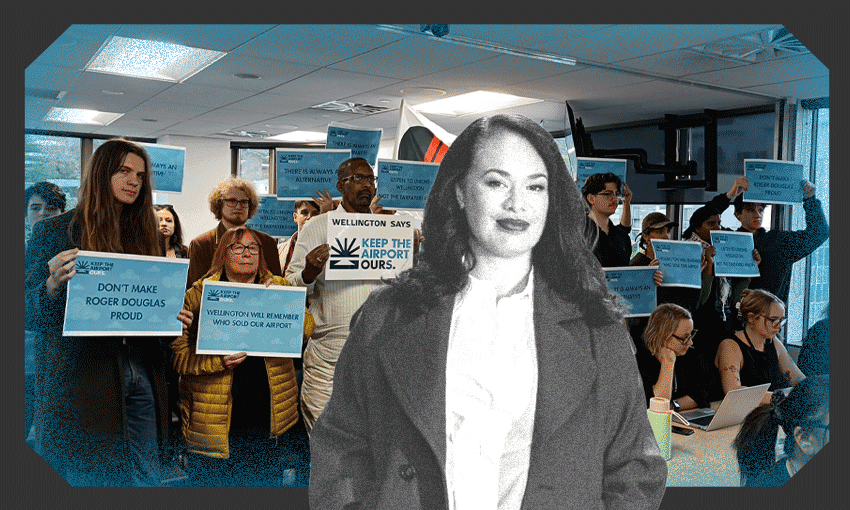A Labour councillor says selling the airport will end the Wellington mayor’s career. But it may not be that simple.
Last Thursday’s Wellington City Council meeting was convened to finalise the long term plan – including the contentious decision to sell the council’s 34% stake in Wellington International Airport. It was the ugliest meeting I’ve ever seen. There were anger, insults, outrage, councillors talking over each other and a jeering crowd of protestors.
The chaos of the Andy Foster years was a tough act to follow, but this meeting managed to outdo it by a country mile. There has always been political division in Wellington local body politics, but now it is deeper, more complex, and personal.
Mayor Tory Whanau managed to pass her long-term plan by the slimmest of margins, 9-7. But it has left a bitter taste in the mouths of many councillors and supporters.
Left-leaning councillors Ben McNulty, Nureddin Abdurahman, and Nīkau Wi Neera, the so-called Airport Three, attempted to introduce a last-minute amendment to halt the airport sale.
As chair of the meeting, Whanau quickly struck down the amendment, refusing to bring it to a vote. “Outrageous,” Wi Neera muttered repeatedly. The crowd of protestors from Unions Wellington gathered in the public gallery booed and laughed at the mayor. Whanau snapped at them: “Can I ask the gallery to calm yourselves?”
That moment symbolised the end of a political partnership. The Green mayor was at bitter odds with a crowd of union members. Whanau looked frustrated. It was evident in the way she conducted the meeting. She knew her power was slipping, and she was white-knuckling her way through the process, shutting down debate and being uncharacteristically blunt. There was no attempt to reach a consensus. She just wanted to get it done.
In his speech, McNulty came out swinging at fellow Labour councillors and the mayor. “Today is the beginning of the end of a number of political careers,” he predicted. “This long term plan is a political obituary.” He read out texts allegedly from Green Party members stating they would not vote to re-select Whanau as the party candidate, opting to campaign for a Labour candidate instead. Wi Neera similarly labelled it as a betrayal of party volunteers. Abdurahman called it “undemocratic, crappy, sugar-coated poison”.
The airport sale has brought the emotions out like no other local debate in a long time. For unionists, it is a deeply felt issue hearkening back to the central government asset sales of the 1980s and ’90s. It won’t be easily forgotten.
But will this really be the issue that brings down Tory Whanau’s mayoralty? It’s certainly possible. But if she had lost the vote on Thursday, it could have been much worse. Failing to pass a long term plan wouldn’t just be a political blunder, it would have had serious legal implications. It could have given local government minister Simeon Brown cause to appoint commissioners or Crown observers. It would have been a political embarrassment that defined Whanau’s mayoralty. Making some unpopular decisions is survivable; being seen as an incompetent failure is not.
As passionate as some activists are, the airport sale isn’t necessarily an issue that resonates with a broad swath of voters. The council only owns a 34% stake, not enough to have any proper control. There are some compelling arguments in favour of selling the airport: it would diversify the council’s holdings and create more insurance headroom. A private owner may actually be better for the airport’s growth, and the council would still be the consenting authority. Whanau will have to hope most voters see the sale as pragmatic centrism – or simply don’t care that much either way.
A Labour candidate (whoever that may be) is in a stronger position to win the next mayoral election than ever before. But there is still a path to victory for Whanau. The centre is a very broad area, especially in local politics, where most people aren’t that engaged and their stances are fairly malleable. In Wellington, green-tinged centrism could be a winning formula. Whanau could mould herself into a business-friendly teal candidate who is pragmatic but still assuages voters’ concerns about climate change and social issues. It’s also worth remembering, Wellington city council has an STV voting system. Being the most popular second choice counts for a lot.
The airport sale issue will play out until December, when the council will have to decide on the details of the sale. Who will buy the shares, how much will they sell for, and what kind of investment fund will they be transferred to? It’s still possible the deal could die if the right buyer doesn’t emerge. The Airport Three insist they’re not giving up, so things could get messier still.


